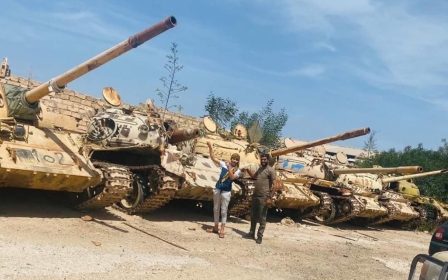Haftar strikes Tripoli as Libya's rival GNA retakes major coastal cities

Forces led by eastern Libyan commander Khalifa Haftar launched air strikes on Tripoli early on Tuesday after losing a string of cities to the west of the capital in a major advance by rival forces.
Loud explosions were heard throughout the night in the capital, while several homes were hit around Mitiga air base, AFP reported.
The air strikes followed a military operation on Monday by forces loyal to the UN-recognised Government of National Accord (GNA), where the coastal cities of Surman, Sabratha, Al-Ajilat, Al-Jamail, Riqdalin, Al-Essa and Zeltin were recaptured from Haftar’s self-styled Libyan National Army (LNA).
No casualties have been reported as of midday on Tuesday.
New MEE newsletter: Jerusalem Dispatch
Sign up to get the latest insights and analysis on Israel-Palestine, alongside Turkey Unpacked and other MEE newsletters
Translation: In one day, seizing control of six cities, with an area of 3,250 kilometres.
The GNA accused Haftar of taking revenge against Tripoli's civilians following losses suffered by his forces.

"The criminal militia and mercenaries have taken out their anger on residential neighbourhoods of Tripoli to avenge their defeat, firing dozens of rockets and missiles on the capital indiscriminately," spokesman Mohamed Gnounou said.
Haftar's LNA has been staging an offensive on GNA-held Tripoli for nearly a year.
The United Arab Emirates, Egypt and Russia have been supporting the LNA militarily, while Turkey, Qatar and allied Syrian fighters are backing the GNA.
The two rival administrations have been vying for the control of the oil-rich country that has suffered conflict since the ousting of Libya's longtime leader Muammar Gaddafi in 2011.
Fighting between the rival forces has continued to rage in recent weeks despite the threat posed by the coronavirus pandemic on the country's fragmented and overstretched health system.
Middle East Eye delivers independent and unrivalled coverage and analysis of the Middle East, North Africa and beyond. To learn more about republishing this content and the associated fees, please fill out this form. More about MEE can be found here.




